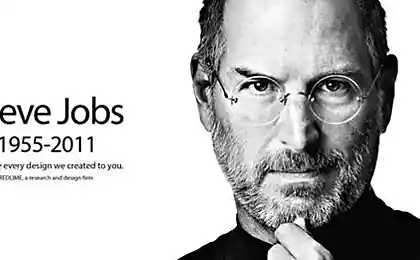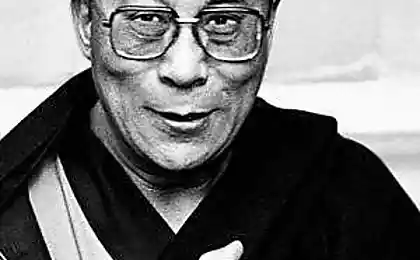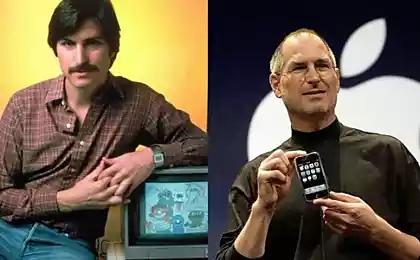580
Why you should not try to live like Steve jobs

© Alex Varanese
The network is very popular materials about the rules of life of outstanding people. It is interesting to know how the work of Balzac as he began his day Franklin and how many went to bed Kafka. However, it is foolish to believe that, observing the same rituals, you can achieve the same success. One of the main problems of human thinking — the distortion of narrative, that is, the simplification of complex and ambiguous stories and turning them into short and clear history.
On the Internet you can find a lot of information about the strict daily routine of Benjamin Franklin, who was all painted on the clock. Publications on this theme are invariably accompanied by an example of his diary. Readers are encouraged to take it for a sample schedule. Also journalists and bloggers like to cite as an example the writer Maya Angelou, who rented a room in a hotel so I work there. Steve jobs in his youth led a very sheltered life, content with only the most necessary things. Thousands of it people are now trying to emulate this strict minimalist style.
In General, the worship of the great is not such a bad thing. For some celebrity inspiration. However, the desire to emulate the heroes were led to the over simplification of their lives. Headlines like "8 ways to think like Warren Buffett" or "the Socratic Method: how to improve your life" attracted the attention of the audience and is actively replicated on the Internet. As a result bloggers and journalists pull out some facts from someone else's life, publish them online or even write about this book, forcing readers to believe that in these particular phenomena is the key to success of a celebrity.
As a result, "entrepreneurs-schemers" and "creators on the sofa" that supposedly follow the great using their "productivity secrets", instead of doing real work. Even today's billionaires did not escape this fate. Founder of Square Jack Dorsey in everything imitated Steve jobs, believing that thus he will achieve greater success. Sometimes imitation reached ridiculous. About this obsession Dorsey writes Nick Bilton in his book "the Birth of Twitter:
"During a conversation with one famous designer at Apple who also worked at Square, Jack found out that jobs considered himself more of a editor than the CEO of the company. Soon Jack began to speak of himself as editor, not only as the Director of Square. In an address to staff he said: "I talked a lot about the editorial nature of their work. I think I'm just the editor". Speaking about the products of the company, Jack began to use the phrase from an interview of Steve jobs that he gave at a conference in early 2010: "This had never been done." Then Jack borrowed from the public speeches of Steve jobs the word "magic", "surprise", "amazing" to describe the new features Square".
In his bestseller "the Black Swan" Nassim Taleb describes the tendency of people to come up with different stories, especially if they conform to our worldview. If we believe that all successful leaders sleep during the day, we will remember all the existing biographies that mention that mark Zuckerberg likes to take a NAP at lunch time. If you to read more and to pick different funny stories, you can get a detailed picture of what I have to do all the "successful" people. "Once your mind has settled in a certain mindset, you will consider only those cases that confirm your right. Paradoxically, the more information you have, the more justified you will be provided their own views," writes Taleb. Next, he talks about the tendency of people to narrative: "the creative And scientific endeavors is the result of our need to destroy the multidimensionality of the universe and impose order. Think about the world around us, think about a trillion things, of which it is composed. Try to describe them, and you will feel the temptation to weave into his narrative some thread. A novel, short story, myth, tale — one function: they spare us from the difficulties of the world and protect it from randomness. Myths bring order to the chaotic human perception and "chaos of human experience".
"Worst of all, when copying a behavior of idol, man suppress his own temperament, which, perhaps, could be a formula for success"
Recall, for example, the myth that startups comes up with a small group of guys from the garage. Or the myth that all founders of major companies worked 80 hours a week to succeed. Or the myth that successful developers must pay attention to every little detail. These "secrets of success" create a mythology around certain behavior patterns, but have little to do with the success of a real person, who applied them in practice. Worst of all, when copying a behavior of idol, man suppress his own temperament, which, perhaps, could be a formula for success. The world doesn't need more Brand Startup with their startups or Stefani Sagmeister creating art. The world needs new ideas and new approaches, starting with finding his own "I".
Simplifying the lives of famous people leads to the abstract fictional character, imposing mere mortals some unattainable standards. Do you think that if you go to bed early, will be a great athlete? Golfer tiger woods was able to party until three in the morning and still beat everyone on the field. Is there a need for perfect order in the workplace? If you give Bob Dylan a case of beer and a Notepad and put it on the back of the car, he still write a song better than most of us. In articles and books suggest us to do any one certain thing that will help us to realize our dream, because that is what a particular famous person. Such texts exist for the reason that calls in the spirit of "grasp the job" are not very popular in the network and not getting enough likes on Facebook.
Taking for granted the statement "All people who want to succeed in the field X, must do Y", we forget about what Taleb called "a hidden testimony." There are a huge number of disaffected businessmen who survived the collapse of their companies, despite the fact that led a minimalist lifestyle in the spirit of Steve jobs. Many writers never released a novel, although he created for himself a special working space in the manner of Angelou. In articles and books that advocate those or other rituals as the key to success, is rarely mentioned history of failures in which was observed the same rituals. Meanwhile, there are many more. Referring again to the "Black Swan":
"For example, you attribute the success of Honore de Balzac, French novelist of the nineteenth century, his ruthless "realism", "insights", "acuteness of the senses", "study of the characters", "ability to captivate the reader" and so on. These "excellent" qualities you can recognize a necessary prerequisite to the creation of excellent artworks provided and only provided that those who do not have the so-called "talent", do not have these qualities. What if there was dozens of equally wonderful literary creations that we have not reached? If you really were written and disappeared equally valuable manuscripts, I'm sorry to say, your idol Balzac differs from his opponents only obscure the fact that he was incredibly lucky. Moreover, bowing to the Balzac, do you allow the injustice to others. I do not mean that Balzac was not talented, I just want to say that his talent is less unique than you think."
Can't glance at someone's life, to bring success to only a few basic character traits of a person. It quenches our thirst to the creation narrative, but this over-simplification does not benefit. I don't want to say that success is only a matter of luck. It is true that the luck never hurts. However, to act like success can be achieved by following few useful tips that is to look at the back cover of the book and assume that you read it.
Life is complicated, and the road to success is winding and confusing. It is similar to dark labyrith, go where you want on their own, creating their own rules. This is much harder but much more interesting.
Source: theoryandpractice.ru
























